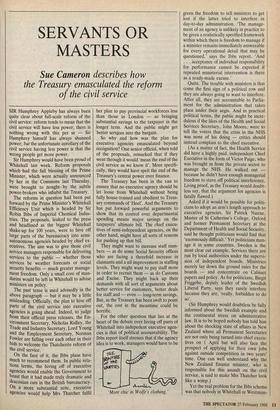SERVANTS OR MASTERS
Sue Cameron describes how
the Treasury emasculated the reform of the civil service
SIR Humphrey Appleby has always been quite clear about full-scale reform of the civil service: reform tends to mean that the civil service •will have less power; there is nothing wrong with this per se — Sir Humphrey himself has always shunned power; but the unfortunate corollary of the civil service having less power is that the wrong people get more power. • Sir Humphrey would have been proud of Whitehall last week. Reform--proposals which -had the full blessing of the Prime Minister, which• were actually announced by her in the Commons last Thursday, were brought to nought by the subtle power-brokers who inhabit the Treasury.
The reforms in question had been put forward by the Prime Minister's Whitehall Efficiency Unit which is headed by Sir Robin Ibbs of Imperial Chemical Indus- tries. The proposals, leaked to the press and headlined• as the biggest Whitehall shake-up for 100 years, were to hive off large parts of the bureaucracy into semi- autonomous agenciis headed by chief ex- ecutives. The aim was to give those civil service managers responsible for delivering services to the public — whether those services be weather forecasts or social security benefits — much greater manage- ment freedom. Only a small core of man- darins would be left in Whitehall to advise ministers on policy. The past tense is used advisedly in the above paragraph — but it may be a little misleading. Officially, the plan to hive off Parts of the civil service into executive agencies is going ahead. Indeed, to judge from their official press releases, the En- vironment Secretary, Nicholas Ridley, the Trade and Industry Secretary, Lord Young and the Employment Secretary, Norman Fowler are falling over each other in their bids to welcome the Thatcherite reform of the civil service.
On the face of it, the Ibbs plans have much to recommend them. In public rela- tions terms, the hiving off of executive agencies would enable the Government to boast that it had made truly dramatic and draconian cuts in the British bureaucracy. On a more substantial note, executive agencies would help Mrs Thatcher fulfil her plan to pay provincial workforces less than those in London — so bringing substantial savings to the taxpayer in the longer term. And the public might get better services into the bargain.
So why and how was the plan for executive agencies emasculated beyond recognition? One senior official, when told of the proposals, remarked that if they went through it would 'mean the end of the civil service as we know it'. More specifi- cally, they would have spelt the end of the Treasury's central power over finance.
The Treasury has been in the van to ensure that no executive agency should be let loose from Whitehall without being fully house-trained and obedient to Treas- ury commands of 'Heel'. And the Treasury has put forward powerful arguments to show that its control over departmental spending means major savings on the taxpayers' ultimate bill. The chief execu- tives of semi-independent agencies, on the other hand, might have all sorts of reasons for pushing up that bill.
They might want to increase staff num- bers — as do some Social Security offices who are facing a threefold increase in claimants and a nil improvement in staffing levels. They might want to pay staff more in order to recruit them — as do Customs and Excise. They might back up their demands with all sort of arguments about better service for customers, better deals for staff and — even — long-term savings. But, as the Treasury has been swift to point out, the cost in the meantime could be horrific.
For the other question that lies at the heart of the debate over hiving off parts of Whitehall into indepedent executive agen- cies is that of political accountability. The Ibbs report itself stresses that if the agency idea is to work, managers would have to be `More chic- in Wolfe's clothing.' given the freedom to tell ministers to get lost if the latter tried to interfere in day-to-day administration. The manage- ment of an agency is unlikely in practice to be given a realistically specified framework within which there is freedom to manage if a minister remains immediately answerable for every operational detail that may be questioned,' says the Ibbs report. 'And . . . acceptance of individual responsibility for performance cannot be expected if repeated ministerial intervention is there as a ready-made excuse.'
Quite. The trouble with ministers is that come the first sign of a political row and they' are always going to want to interfere. After all, they are accountable to Parlia- ment for the administration that takes place under their aegis. And in practical political terms, the public might be incre- dulous if the likes of the Health and Social Services Secretary, John Moore, were to tell the voters that the crisis in the NHS was none of his doing — critics should instead complain to the chief executive.
(As a matter of fact, the Health Service did have a highly paid, independent Chief Executive in the form of Victor Paige, who was brought in from the private sector to manage the NHS. He walked out because he didn't have enough managerial freedom to stave off political interference. Living proof, as the Treasury would doubt- less say, that the argument for agencies is fatally flawed.) Asked if it would be possible for politi- cians to adopt an arm's length approach to executive agencies, Sir Patrick Nairne, Master of St Catherine's College, Oxford and former Permanent Secretary at the Department of Health and Social Security, said he thought politicians would find that 'enormously difficult.' Yet politicians man- age it in some countries. Sweden is the most clear cut example. Services there are run by local authorities under the supervi- sion of independent boards. Ministries merely lay down the ground rules for the boards — and concentrate on Cabinet papers and policy. As for politicians, Birgit Friggebo, deputy leader of the Swedish Liberal Party, says they rarely interfere because they are, 'really, forbidden to do so'.
(Sir Humphrey would doubtless be fully informed about the Swedish example and the continental stress on administrative law. It is to be hoped nobody has told him about the shocking state of affairs in New Zealand where all Permanent Secretaries are not only being turned into chief execu- tives on 1 April but will also face the prospect of applying for their own jobs against outside competition in two years' time. One can well understand why the New Zealand finance minister, who is responsible for this assault on the civil service, is said to make Mrs Thatcher look like a wimp.) Yet the real problem for the Ibbs scheme was that nobody in Whitehall or Westmins- ter was actively backing it. Admittedly, Sir Robin Ibbs had the ear of the press and of the Prime Minister. But Mrs Thatcher, while happy to back cosmetic changes in the civil service if they hold out hope of lower costs and smaller numbers, has never been much interested in thoroughgoing reform of the Whitehall machine.
So the Treasury and the permanent secretaries and the lesser politicians were able to 'resolve' the matter — as they themselves would say. They have not blocked the Ibbs proposals. Such crude opposition would be unthinkable. They have simply doctored the scheme a little the Treasury has always been adept at wielding the veterinarian's knife over the potent parts of others. Hence last Thurs- day's full frontal announcement that a whole host of executive agencies are to be set up. Prime candidates include the Met. Office, the Passport Office (hardly central to Whitehall's thinking, either of them) the Jobcentres and the unemployment benefit offices (both largely devolved already), the Royal Parks and the Royal Palaces.
Not that it would matter too much if larger, more important parts of Whitehall were to be turned into executive agencies. Last Thursday's press conference — in the Treasury building — revealed the terms on which the new agencies were to list. Their chief executives will be answerable through permanent secretaries — to ministers. The framework under which they will operate will have to be agreed with ministers. And ministers will negotiate agency budgets, on behalf of chief executives, with — the Treasury.
Sir Robin Butler, the new Cabinet Secretary and Head of the Home Civil Service, admitted there had been 'real difficulty in reconciling' the need for grea- ter management flexibility with overall, central control of finance. But Sir Robin, who comes from the Treasury, denied absolutely that there had been any 'row' with the Treasury over the reforms. It has been, it insisted, a 'discussion'.
Mr Richard Luce, Minister for the Home Civil Service, told the press confer- ence it would be 'rather odd if we surren- dered our central power completely'. And Mr Peter Kemp, the Treasury man who has been appointed Second Permanent Secret- ary in charge of the entire agency project, remarked that where executive agencies were concerned, ministers would have to be allowed to 'move the goal posts'.
They were a joy to behold. Sir Hum- phrey would undoubtedly have approved. He might even — with the greatest respect — have laughed.
Sue Cameron works on A Week in Politics and this week presented a film on the civil service. She was for 18 months seconded from the Financial Times to the Department of Energy.



















































 Previous page
Previous page